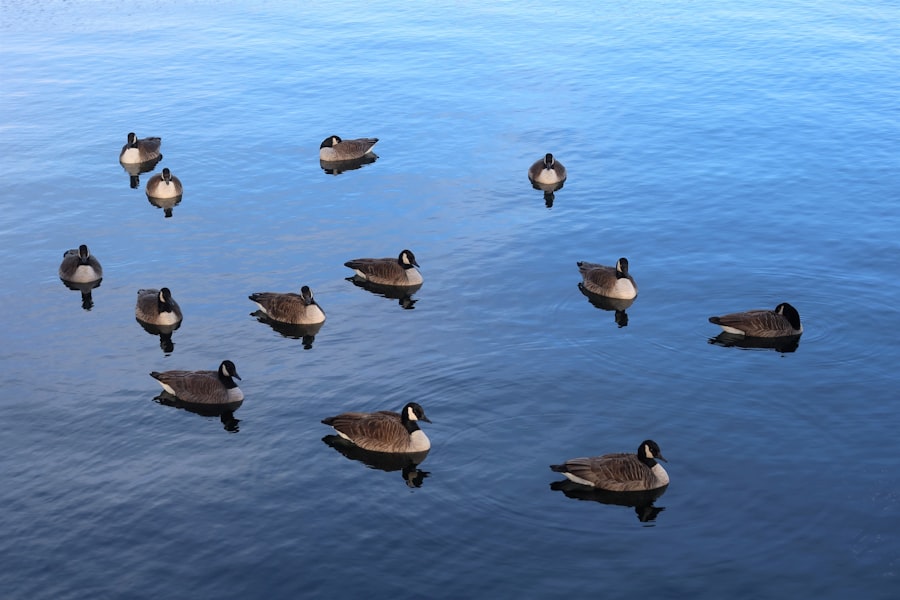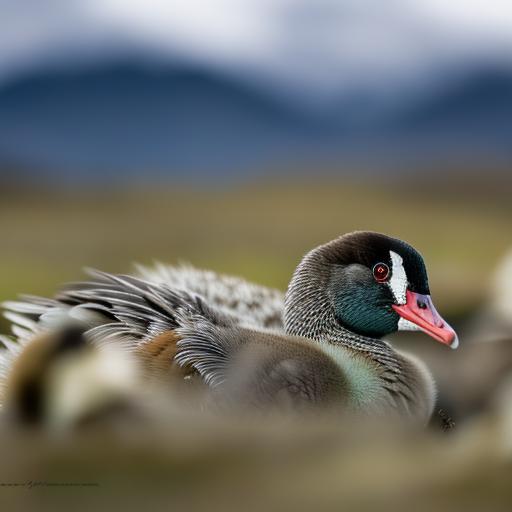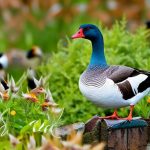Geese have a long history in New Zealand, dating back to the early European settlers who brought them over for their meat and feathers. Today, keeping geese is a popular hobby and even a profitable business venture for many people in the country. Geese are known for their friendly and social nature, making them great companions for both individuals and families.
There are several benefits to keeping geese in New Zealand. Firstly, they are excellent grazers and can help keep your lawn or pasture trimmed. They also produce large eggs that are delicious and nutritious. Additionally, geese can be raised for their meat, which is lean and flavorful. Their feathers can also be used for various crafts and products.
Key Takeaways
- Keeping geese in New Zealand is a rewarding and enjoyable experience for many farmers and homesteaders.
- Choosing the right breed of geese depends on your needs, such as egg production, meat quality, or ornamental value.
- Housing and fencing requirements for geese include providing adequate shelter, space, and protection from predators.
- Feeding and watering geese requires a balanced diet of grains, greens, and clean water, with supplements as needed.
- Health and wellness of geese can be maintained through regular check-ups, vaccinations, and treatment of common issues like parasites and infections.
Choosing the Right Breed of Geese for Your Needs
When it comes to choosing the right breed of geese for your needs, there are several popular options in New Zealand. The most common breeds include the Embden, Toulouse, Chinese, and African geese. Each breed has its own unique characteristics and qualities.
Factors to consider when choosing a breed include the purpose of keeping geese (meat, eggs, or feathers), the climate in your area, and the amount of space you have available. Some breeds are better suited for colder climates, while others thrive in warmer regions. It’s also important to consider the temperament of the breed, as some geese can be more aggressive than others.
Housing and Fencing Requirements for Geese
Geese require proper housing and fencing to ensure their safety and well-being. There are several types of housing options for geese, including sheds, barns, or simple shelters. The housing should provide protection from the elements and predators, as well as enough space for the geese to move around comfortably.
Fencing is also essential to keep geese contained and safe from predators. A sturdy fence that is at least four feet high is recommended to prevent geese from escaping. It’s important to ensure that the fence is secure and has no gaps or holes that geese can squeeze through. Electric fencing can also be used as an additional deterrent for predators.
To keep geese safe from predators, it’s important to provide them with a secure and enclosed area to roam during the day. This can be achieved by using portable electric netting or by creating a secure paddock with a combination of fencing and netting. It’s also important to regularly check the perimeter of the enclosure for any signs of damage or potential entry points for predators.
Feeding and Watering Geese: Best Practices
Geese have specific dietary needs and require a balanced diet to stay healthy. They are grazers by nature and enjoy eating grass, weeds, and other vegetation. However, it’s important to supplement their diet with additional feed to ensure they are getting all the necessary nutrients.
Geese can eat a variety of foods, including grains, vegetables, fruits, and even insects. Commercially available goose feed is also an option and can provide a balanced diet for your geese. It’s important to provide fresh water at all times, as geese need access to clean water for drinking and bathing.
When feeding geese, it’s important to avoid overfeeding them, as this can lead to obesity and health issues. It’s best to feed them small amounts throughout the day rather than one large meal. Additionally, it’s important to monitor their weight and adjust their feeding accordingly.
Health and Wellness of Geese: Common Issues and Solutions
Like any other animal, geese can experience health issues from time to time. Some common health issues in geese include respiratory infections, parasites, and foot problems. It’s important to be proactive in preventing these issues and providing proper care when needed.
To prevent health issues in geese, it’s important to provide them with a clean and dry living environment. Regularly cleaning their housing and removing any wet or soiled bedding can help prevent respiratory infections. It’s also important to regularly check for parasites and treat them accordingly.
If a goose does become sick, it’s important to seek veterinary care as soon as possible. A veterinarian can diagnose the issue and provide appropriate treatment. It’s also important to quarantine any sick geese to prevent the spread of illness to the rest of the flock.
Breeding and Hatching Geese: Tips and Tricks

Breeding geese can be a rewarding experience, but it requires careful planning and preparation. Geese typically reach sexual maturity at around two years of age. It’s important to have a suitable breeding pair, with one male and one female, for successful breeding.
To encourage breeding, it’s important to provide a suitable nesting area for the female goose. This can be a simple nest box filled with straw or other soft bedding material. The female will lay her eggs in the nest and incubate them for about 28-30 days.
During the incubation period, it’s important to provide the female with privacy and a quiet environment. It’s also important to monitor the temperature and humidity levels in the nesting area to ensure optimal conditions for hatching.
Raising Goslings: Essential Care and Nutrition
Once the goslings hatch, they require special care and attention to ensure their health and well-being. It’s important to provide them with a warm and dry environment, as they are susceptible to cold temperatures. A brooder box or heat lamp can be used to provide warmth.
Goslings have specific nutritional requirements and should be fed a balanced diet that is high in protein. Commercially available chick starter feed is a good option for goslings. It’s important to provide fresh water at all times, as goslings need access to clean water for drinking and bathing.
It’s also important to handle goslings gently and provide them with socialization opportunities. This will help them become accustomed to human interaction and make them easier to handle as they grow older.
Training Geese: Basic Commands and Techniques
Training geese can be a fun and rewarding experience. Geese are intelligent animals and can learn basic commands and tricks with proper training. Some basic commands for geese include “come,” “stay,” and “heel.”
To train geese, it’s important to use positive reinforcement techniques, such as treats or praise, to reward desired behaviors. It’s also important to be patient and consistent with training sessions. Short, frequent training sessions are more effective than long, infrequent ones.
Training geese can have several benefits, including improved obedience, better control, and increased bonding between the geese and their owners. It can also be a fun activity for both the geese and their owners.
Harvesting Geese: Slaughtering and Processing for Meat and Feathers
If you are raising geese for meat or feathers, it’s important to know how to properly harvest them. Slaughtering geese should be done humanely and with minimal stress to the animals. It’s important to use sharp knives and make clean cuts to ensure a quick and painless death.
After slaughtering, the geese should be properly processed for meat or feathers. This includes plucking the feathers, cleaning the carcass, and preparing it for consumption or further processing. It’s important to follow proper food safety guidelines when handling and processing meat.
Selling Geese: Marketing and Business Strategies for Profitability
If you are interested in selling geese for profit, it’s important to have a solid marketing plan in place. This includes identifying your target market, developing a brand, and creating a marketing strategy to reach potential customers.
There are several ways to market geese, including selling them directly to consumers, supplying local restaurants or markets, or even selling them online. It’s important to have a clear pricing strategy and to communicate the benefits of your geese to potential customers.
To make a profit from geese, it’s important to carefully manage your expenses and maximize your revenue. This includes keeping track of costs such as feed, housing, and veterinary care, as well as pricing your geese competitively.
In conclusion, keeping geese in New Zealand can be a rewarding experience. By choosing the right breed, providing proper housing and fencing, feeding and watering them correctly, and taking care of their health and wellness, you can raise healthy and happy geese. Breeding and hatching geese, raising goslings, training geese, harvesting geese, and selling geese can also be profitable ventures. With the right knowledge and techniques, you can enjoy the benefits of keeping geese in New Zealand.
If you’re interested in keeping geese in New Zealand, you may also find this article on poultrywizard.com about keeping guinea fowl with chickens informative. It discusses whether guinea fowl can live harmoniously with chickens and provides valuable insights into their compatibility. To learn more, click here.
FAQs
What are geese?
Geese are waterfowl birds that belong to the family Anatidae. They are known for their long necks, webbed feet, and distinctive honking sound.
Why keep geese in New Zealand?
Geese can be kept for various reasons in New Zealand, including as pets, for meat production, for egg production, or as weed controllers.
What do geese eat?
Geese are herbivores and primarily feed on grass, weeds, and other vegetation. They may also eat insects, snails, and small fish.
How do you care for geese?
To care for geese, you need to provide them with a clean and safe living environment, access to fresh water and food, and regular veterinary check-ups. You also need to protect them from predators and provide them with adequate space to move around.
What are the benefits of keeping geese?
Keeping geese can provide various benefits, including a source of meat and eggs, natural weed control, and companionship. They can also be used for pest control in orchards and vineyards.
What are the potential risks of keeping geese?
The potential risks of keeping geese include the spread of diseases, aggressive behavior towards humans or other animals, and damage to crops or property. It is important to take necessary precautions to prevent these risks.
Do geese require any legal permits to keep in New Zealand?
In New Zealand, geese do not require any legal permits to keep as pets or for personal use. However, if you plan to sell geese or their products, you may need to comply with certain regulations and obtain necessary permits.
Meet Walter, the feathered-friend fanatic of Florida! Nestled in the sunshine state, Walter struts through life with his feathered companions, clucking his way to happiness. With a coop that’s fancier than a five-star hotel, he’s the Don Juan of the chicken world. When he’s not teaching his hens to do the cha-cha, you’ll find him in a heated debate with his prized rooster, Sir Clucks-a-Lot. Walter’s poultry passion is no yolk; he’s the sunny-side-up guy you never knew you needed in your flock of friends!







